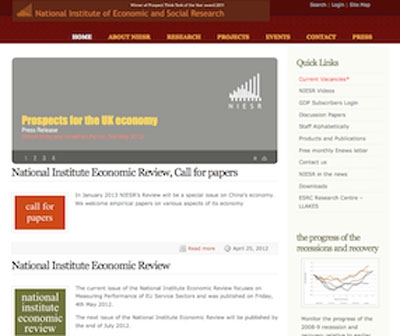
NIESR says UK economy is 4 per cent smaller than peak size

Although NIESR's inflation forecast has increased, largely as a result of the increase in oil prices, it still expects it to fall below target by the end of the year
It expects the cyclically adjusted current budget to be in slight surplus in 2016-17 but warns that the unemployment rate could rise to almost 9 per cent at the end of this year, and to remain elevated throughout the forecast period. This will do permanent damage to the UK's productive capacity, says NIESR.
NIESR says that the UK economy contracted in the first quarter of this year by 0.2 per cent, returning the economy to recession but revisions may change this. However, small quarter to quarter movements of this sort are largely irrelevant to the broader picture of an economy that remains very weak.
Its monthly estimate of GDP suggests the level of economic activity in the economy in March 2012 was the same as in September 2010. This clearly does not constitute a sustained recovery, so the question of whether or not the economy is technically in a double-dip recession is moot, it says.
Such weakness is likely to persist over the next couple of quarters, and means that growth this year will be close to zero. But from the start of next year it expects more robust growth, with a sustained period of above-potential growth from 2014, which is necessary to reduce the output and unemployment gaps.
A spokesman said: "It remains our view that fiscal policy could be used to raise aggregate demand in the economy with little to no loss of fiscal credibility. We have never and do not now advocate scaling back the government's medium- to longer-term policy of fiscal consolidation. However, the UK also suffers from a lack of demand in the short term. As we noted in our January Review, a 1 per cent of GDP increase in government investment this year would boost GDP by around 0.7 per cent, assuming no reaction by the MPC. A temporary boost to net investment, which has been cut extremely sharply, would have no direct effect on the government's primary fiscal target of balancing the cyclically-adjusted current budget in 2016-17."
The forecast for the UK economy is published in the National Institute Economic Review, no. 220, April 2012
The National Institute Economic Review is the quarterly journal of the National Institute of Economic and Social Research (NIESR).
Globally, NIESR says that its baseline forecast is for global growth of 3.7 per cent in 2012. Growth will accelerate to 4 per cent in 2013.
It assumes a delayed but ultimately successful resolution of the Euro Area crisis. Nevertheless, it expects a mild recession in the Euro Area as a whole, as well as in the UK. Downside risks to the Euro Area will remain high.
It forecasts growth of about 2 per cent in the US this year, while China and India, although slowing, will continue to drive world growth.
In 2013, it sees some rebalancing of global growth, as the Euro Area recovers somewhat, growth picks up further in the US, and China continues to slow. Global current account imbalances, however, remain elevated, although not at pre-crisis levels.
